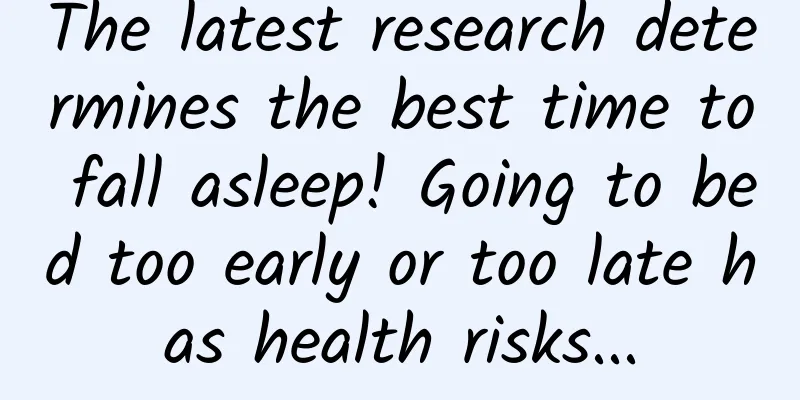The latest research determines the best time to fall asleep! Going to bed too early or too late has health risks...

|
Everyone is familiar with the dangers of staying up late: poor energy, slow reaction, decreased memory, reduced immunity, and even premature aging. So is it better to go to bed earlier? Not really. Recently, in a large-scale study published in November 2021 in the European Heart Journal Digital Health, a journal of the European Society of Cardiology (ESC), a research team from the University of Oxford in the UK and other institutions discovered the best "bedtime" for preventing cardiovascular disease. Moreover, going to bed too early or too late can cause health risks... Have you found the “best time to fall asleep”? Participants ranged in age from 37 to 73 years, with an average age of 61 years, and were followed to identify newly diagnosed cases of cardiovascular disease, defined as myocardial infarction, heart failure, chronic ischemic heart disease, stroke, and transient ischemic attack. The researchers found that after correcting for confounding factors such as age, gender, sleep duration (short and long sleep durations are associated with a higher risk of cardiovascular disease), body mass index, diabetes, blood pressure, etc., the sleep onset time showed a "U"-shaped relationship with cardiovascular disease risk: people who sleep between 22:00 and 22:59 have the lowest risk of cardiovascular disease, and going to bed too early or too late will increase the risk of disease. The risk of falling asleep in the early morning (24:00) and later at midnight or later is the highest. (This time refers to local time, not Beijing time.) The European study is the most extensive to date to objectively assess the relationship between sleep and cardiovascular disease risk. A clear link between bedtime and cardiovascular disease risk was demonstrated, particularly in women. The optimal "bedtime" lies within a certain range of the daily cycle, and deviations from this range, either too early or too late, can be problematic. Which is more harmful, staying up late or not getting enough sleep? Previous research from the University of California has shown that both sleeping too much and too little can be harmful to your health. The answer may be the biological clock. Violating the rules of the biological clock will cause harm to your health. Irregular work and rest will affect the reset of the "biological clock". All life on Earth has a physiological mechanism called the biological clock (2017 Nobel Prize in Physiology or Medicine). Each of us has a biological clock inside our body, which is a 24-hour cycle from day to night. It is an invisible clock, a cycle of light and dark that coincides with the rotation of the earth. The biological clock is controlled by the suprachiasmatic nucleus of the hypothalamus in the brain. Both waking and eating behaviors are attributed to the biological clock, which is the inherent rhythm of the life activities of organisms and helps regulate the physical and mental functions of the human body. If you don't follow the rhythm of your biological clock to arrange your work and rest, your body will feel tired and uncomfortable, which will have a great negative impact on your physical and mental health in the long run. The most typical example is the well-known jet lag, or "jet lag syndrome" in medicine. Patients with fatigue from long-distance flights across multiple time zones will suffer from insomnia at night and drowsiness during the day due to circadian rhythm disorders. In severe cases, they may experience headaches, palpitations, nausea, and decreased judgment and concentration. Of course, some people are born to like to go to bed early, while others prefer to go to bed late. Everyone has a unique internal timer to regulate. At present, science's understanding of sleep and biological clock is far from enough, and we need to further explore the mystery. How to maintain the biological clock? So, how do we maintain our body’s biological clock and keep our body and mind healthy? 1. Bedtime Go to bed before 23:00. But don't stay up late, use the time you originally used to stay up late to sleep, and use the time you sleep late to get up early. 2. Appropriate sleep time People have different sleep needs. Different energy consumption leads to different sleep durations. The quality of sleep is not equal to the length of sleep. How much sleep a person needs changes with age: Newborns need to sleep 16-20 hours a day Children and adolescents need 9-10 hours, and at least 8.5 hours Adults need even less sleep, only 7-8 hours Older people only need 5-6 hours of sleep 3. Sleeping habits It is best to set a fixed time every day and rise and set with the sun. "Work at sunrise and rest at sunset" should follow the rules of the biological clock and do not disrupt it at will. Sleep is largely a habit, so maintain good sleeping habits and follow the natural laws of sleep. 4. For people who frequently fly across time zones, it is important to pay attention to jet lag. This article was reviewed by Xue Shimin, deputy chief physician of the Department of Respiratory Medicine, Yulin Second Hospital |
<<: Beware of danger! How to deal with gas leaks correctly?
Recommend
What exactly happened when I blacked out after drinking?
© Getty Images Leviathan Press: Almost all of my ...
In order to record the most ordinary rare animals, I wrote a book for clams
River clams, a type of creature that is familiar ...
WeChat's latest beta version released: dark mode and message quotes are here
[[286063]] It’s coming, it’s coming, WeChat is co...
What are the most cost-effective APP promotion methods?
This topic is not my best, because most of my pre...
What is this scary technology? Huawei demonstrates Android's new file system EROFS: faster phones
Although the file system sounds a bit obscure, in...
Why would Google open source its most important secrets?
Google's technology is one of the main drivin...
Penguins may be the first bird you know.
Penguins may be the first bird you know, in carto...
Dust and noise are too loud. Can planting green plants reduce noise? Cedar: Watch me do it!
Cedar is a plant of the genus Cedrus in the Pinac...
It’s called orchid but it’s not an orchid. This new species discovered in Wuhan is not simple!
Recently, a paper on a new plant species discover...
H5 Mobile Debugging Guide
[[406894]] A brief summary: Mobile debugging pain...
Case Study | Advertising Hacker: A Very Low-Cost Way to Expose Your Brand
The main idea of hacker advertising is "in...
Give archaeology a helping hand! Technology prevents "cultural relics tragedy" from happening again
In the long history of China over 5,000 years, th...
Favor + benefit, "borrowing electricity" from Wei, Xiaoli and Li Auto, Lei Jun and his Xiaomi Motors made another good move
There are no eternal rivals in the automotive ind...
WeChat has launched a new function, the internal testing of the deep cleaning function, which can clean up WeChat storage space with one click
[[429252]] With the continuous update and iterati...
Where is the road to operation going?
The operations profession has only been on track ...









